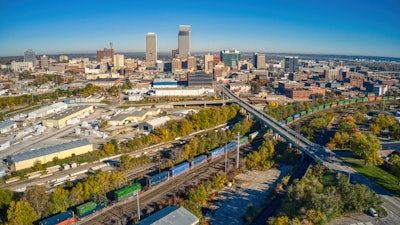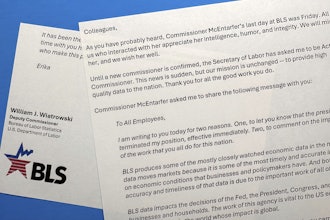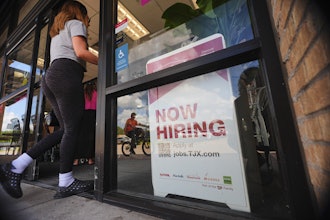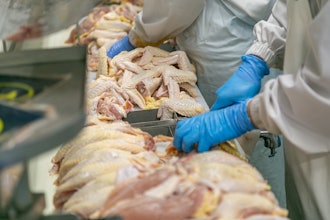
CHAMPAIGN, Ill. — On June 10, dozens of masked federal agents filed into the Glenn Valley Foods meatpacking plant in South Omaha, presenting a warrant to company officials to conduct an immigration raid. As agents entered the production floor, stunned workers in hard hats and hair nets were told in Spanish to raise their hands.
"Manos arriba!"
The next day, production at the chicken and steak plant dropped 80%, according to company officials.
At least 74 of the plant's nearly 140 workers had been arrested and taken to a detention facility. Many of the workers who weren't arrested were afraid to return to work.
"It's just this overwhelming sense of helplessness," said Ron Hug, an Omaha councilmember who represents the city's southside, a hub for both meatpacking plants and immigrants.
In the days that followed, Hug said he heard of other plants, restaurants and businesses struggling to find and hire workers. Many in the community are legal residents, but there's still fear, Hug said.
Asked what would happen to South Omaha if a significant portion of immigrants left, Hug had a stark prediction.
"Two words: Ghost town," Hug said.
This month, President Donald Trump's immigration crackdown began targeting the agriculture sector.
U.S. Immigration and Customs Enforcement raids were reported at strawberry fields in California, a dairy farm in New Mexico and a family-owned farm in western New York.
Farm operators said the raids risked disrupting the nation's food supply, which relies on undocumented residents for more than 40% of its workforce.
Undocumented workers also make up a substantial part of the meat industry, with some estimates as high as 50%.
In South Omaha, the Glenn Valley Foods raid was especially profound, as immigrants have long been a part of the community's social fabric. European immigrants arrived more than 100 years ago to build Omaha into the largest meat-producing city in the world.
More recently, Mexican and Central American immigrants have helped sustain the meatpacking facilities still based in southern Omaha.
Evelia, who did not want her last name published because she is not a legal resident, said her uncle was arrested in the Glenn Valley raid. Her family received a text from him while being detained in a company breakroom and before being transported to a Nebraska detention center.
"This was kind of the worst nightmare for him ... and all of us, really," Evelia told Investigate Midwest. "It was a good job, but I don't know who is going to do it," other than immigrants.
More than 150 years ago, western Nebraska became an ideal location for large ranches that could raise cattle on the prairie's high-quality grass. Nebraska-raised beef was in high demand in the Chicago stockyards, but cows lost weight on the more than 500-mile journey.
In 1883, Wyoming rancher Alexander Swan led a group of investors to establish a stockyard in South Omaha, which was still its own city.
"The location was perfect," a Nebraska State Historical Society article states. "Omaha was surrounded by plenty of grass and corn, and the Missouri River provided both ample water and a swift-moving stream to haul waste away -- a stark contrast to the slow-moving Chicago River that regularly backed up with rank sewage, creating an immense health hazard."
A wave of immigrants from Poland, Ireland, Hungary and other European countries provided much of the labor.
By the mid-1900s, Omaha was the largest meat-producing city in the world.
But as the meat industry underwent automation and consolidation in the 1960s, employment in the packing industry declined.
Over the past few decades, immigrants from Mexico and Central America have spurred new economic growth in South Omaha, particularly along South 24th Street.
The stockyards closed in 1999, but the community remains home to at least 17 meatpacking facilities, including Glen Valley Foods, according to the USDA's Meat, Poultry and Egg Product Inspection Directory.
On the day of the Glenn Valley Foods raid, Omaha city officials said they initially heard rumors of arrests at multiple meatpacking facilities.
Douglas County Commissioner Roger Garcia, who represents parts of South Omaha, hastily left a meeting when he heard about the raids. Garcia went to a nearby JBS plant before realizing Glenn Valley Foods was the only target.
"First, we want to know who's been detained and how many, and then we want to help with legal ... (there's) bound to be children without parents, spouses without husbands and wives," Garcia told KETV. "There's gonna be a lot of hurt in this community today, and we're gonna help them as best we can."
As workers were led away from Glenn Valley Foods, several protesters threw rocks at government vehicles and jumped on their hoods, according to video from the Nebraska Free Press.
Several community groups rallied to provide support to impacted families, including the Center for Immigrant and Refugee Advancement, a Nebraska-based nonprofit, which sent legal teams to various detention facilities to try to meet with arrested workers.
"We will do everything within our power to reconnect families," the nonprofit said in a statement. "Although these circumstances are difficult, we're relieved that they are still in our jurisdiction, where we will be able to provide them direct legal support."
On Sunday, U.S. Immigration and Customs Enforcement said more than 60 detainees were still at a jail facility in nearby Lincoln, while 19 others were transferred or deported.
Last week, Trump acknowledged he's received pushback from the agriculture sector over his immigration raids. After promising "changes" in a social media post, ICE ordered its agents to stop actions that target undocumented individuals not associated with a known crime.
"Effective today, please hold on all work site enforcement investigations/operations on agriculture (including aquaculture and meat packing plants), restaurants and operating hotels," Tatum King, a senior ICE official, wrote in a Thursday email, which was first reported by the New York Times.
Trump said he remained committed to achieving the "single largest Mass Deportation Program in History" but wanted agents to focus on large cities, like Los Angeles and Chicago, according to a social media post.
Nebraska Gov. Jim Pillen blamed the Biden administration for last week's raid in Omaha and said he supported Trump's efforts.
"Under the Biden Administration, the country's immigration policy absolutely failed the American people for four years," Pillen, a Republican, said in a statement. "We have to address the issue of illegal immigration, and I support the work of our federal partners to ensure that the law is followed and I remain supportive of President Trump's efforts to secure the border."
The operators of Glenn Valley Foods said they had complied with the law by utilizing the federal government's E-Verify system to confirm their employees' eligibility to work in the country.
Meat processors have long complained about a shortage of workers and have urged lawmakers to expand their access to immigrants.
Farms can hire guest workers through the H-2A program, which has grown in popularity. Between 2018 and 2023, H-2A applications increased by 72%, according to a report by the U.S. Government Accountability Office.
However, meat facilities are not eligible to hire through the program.
Last year, a bipartisan committee of U.S. House members recommended extending the H-2A program to meatpacking facilities and other year-round agricultural businesses.
Julie Anna Potts, president and CEO of the Meat Institute, said the nation's meat processing industry needed immigration reforms.
"Our members, together with their suppliers and others in the meat and poultry supply chain need changes to the H-2A visa program and modernization of E-Verify to ensure the processing sector has access to a consistent, year-round, legal workforce," Potts said.
Hug, the council member for South Omaha, said the nation's immigration system needs improvements, but last week's raid was a step in the wrong direction.
"I'm all for arresting criminals and nobody wants a criminal on the streets of Omaha," said Hug, whose grandmother immigrated to Omaha from Poland and worked in the city's meat industry. "But unfortunately, in this raid, they caught up individuals who have immigration issues, but are good, hard-working, honest family people, whose only real crime is that they wanted a better life for their family.
"I think the system clearly is broke. Anywhere you go in the country, I don't care what industry it is, we need workers."
This story is provided as a service of the Institute for Nonprofit News' On the Ground news wire.






















